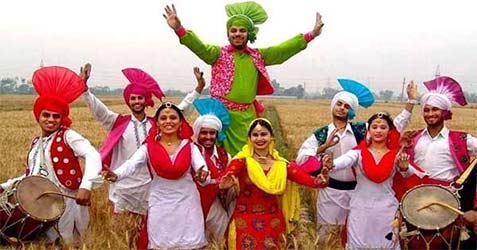


Baisakhi / Vaisakhi 2025
Vaisakhi is celebrated especially in the Indian state of Punjab, where the gospel of the Sikhs began, Vaisakh month (also spelled Baisakh) is particularly significant. Vaisakhi is the most important festival in the Sikh calendar, taking place on the first lunar month of Vaisakh, which falls on 14 April each year.
Vaisakhi is also called Baisakhi. This harvest celebration takes place annually and harvesters celebrate and rejoice about the harvested crops. In Punjab, North India, Vaisakhi (Baisakhi) is not only a harvest festival of the state marking the onset of harvesting of the winter crops, but is also the start of a New year for the Sikhs and Hindus.
It is on Vaisakhi day in 1699 that the 10th Guru Gobind Singh chose the five leaders (called the Panch Pyare, or 'Beloved Five' who formed the Khalsa, the militant fraternity of the Sikhs and created the Khalsa panth and Vaisakhi day holds a spiritual significance for the Sikhs of Punjab.
The Sikh religion commemorates the first five men who comprised the Khalsa with five symbols of 'purity and courage' called five Ks. The five Ks include the Kesh (uncut hair), the Kangha (comb), the Katchera (underwear), the Kara (steel ring), and the Kirpan (sword). The festival holds special significance to Sikhs. Many Sikhs choose to be baptized during this holiday.
Festivals in the Hindu Month of Vaisakh
The 10th Guru Gobind Singh asked who in a crowd of thousands was prepared to die for the cause of religion. Eventually five men volunteered to give their lives but the Guru Gobind Singh did not kill the men. Instead he baptized them and the men became the first five members of a group called Khalsa. The tradition of Sikh baptism during the Vaisakhi festival originated from this historic event.
There the holiday is celebrated in the temples, with a 48-hour reading of the GURU GRANTH SAHIB (the Sikh holy book), prayers, hymns, and sermons. Castelessness, an important Sikh principle, is emphasized by everyone eating and sitting together. People enjoy holiday foods and special treats such as kada prasad (a type of sweet). Afterwards, there is feasting and dancing of the bhangra, a popular and athletic folk dance for men, and women dance the Gidda depicting the entire farming year and much celebration takes place in the form of Samagams, Nagar Kirtan, Gatka exhibitions, Akand Paths and so on. During the Vaisakhi celebration, processions called Nagar Kirtan also make their way along the streets singing hymns from a sacred book of worship known as Guru Granth Sahib.
Offices, educational institutions and major businesses are closed but some shops remain open and offer discounts.